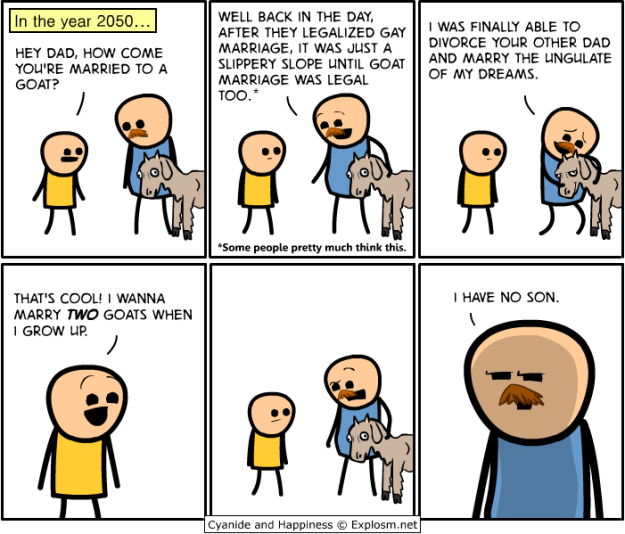As promised, I’d like to elaborate (ramble) a bit now about my thoughts on poly marriage and DOMA.
I’ve always responded to the slippery-slope argument by asserting that poly marriage is not, in fact, anything to be terrified of. I’ve occasionally seen responses from other poly folks that are more along the lines of “everyone should calm down, we’re not interested in marriage right now, anyway.” That might be true, but it’s not really the line I’m interested in taking when it comes to defending the idea of poly marriage. My point has always been that from an ethical perspective, you can’t defend same-sex marriage and then not extend that thinking to plural marriage as well. As for pedophilia and bestiality, it feels absurd that I should even have to point this out, but it seems pretty simple to draw the line at consenting adult humans being free to marry one another. Children and goats are not capable of meaningful consent. Now, some people argue that adult women in fundamentalist polygamy type situations aren’t really provided with the opportunity to give meaningful consent, either. But unfortunately, the same thing is true for a lot of women in fundamentalist religious monogamous marriages as well, and we don’t use that as a reason to throw marriage out all together. The fact that some plural marriages, like plenty of monogamous marriages, happen in a problematic way is not a moral argument against the entire institution. I don’t believe that poly marriage is right around the corner. But if I’m going to defend the ethical implications of it, I’m going to do so in a way that says “if this happened tomorrow, so what? Have you stopped and thought about whether there’s really anything ethically different about this than about monogamous marriage, gay or straight?”
I think that the repeal of DOMA does pave the way in our general direction at least in the ethical sense. I’m inclined to agree with law professor Mark Goldfeder, quoted in USA Today as saying: “It’s one hundred percent likely that these polygamist cases will come, but they will no longer turn on whether a relationship is immoral. The court will look at whether these relationships cause third party harm.” Of course, my personal dividing line of whether or not something is immoral is really no different than the question of whether it causes third party harm. But that aside, I think Goldfeder makes a good point. I think that when polygamist cases are brought before courts in the future, the DOMA decision will have some impact on the outcome. And unlike Wesley Pruden at the Washington Times, I think that’s a positive thing.
While I am all for boldly asserting the ethical acceptability of poly marriage, though, and also genuinely hopeful that either poly marriage will come to pass or the whole government-marriage business will be disbanded one day, I am not particularly interested in placing marriage at the center of poly activism.
Part of my reluctance to place marriage rights at the forefront is really similar to the critiques of the assimilationist nature of the same-sex marriage movement. While a lot of us poly folks (myself included) do have two or more “marriage-like” relationships, a lot of us don’t. Plenty of poly people choose to share a home with only one–or even zero!–partners. Plenty of us who do have two or more cohabiting, life-committed partners also have other lovers outside of that. Part of the beauty of polyamory is its ability to take many different forms, to be many different things, to reject very narrow preconceived molds of what romantic, intimate relationships should look like. And I’m afraid that if marriage becomes our central focus, we’ll put forth a public image of poly that erases all of that wonderful, liberatory variation.
Another concern I have is about the narrowness of marriage as a focus. I address this at a bit more length in a piece that’s forthcoming soon over at Modern Poly, but to put it briefly, I think that if we really look at what compulsory monogamy is and where it comes from in our society, we can talk about patriarchy. We can talk about capitalism. And I feel like we can say “you know, I really just want to marry two people and live in the suburbs” and leave it at that. Or we can have these conversations about radically challenging the dominant power structures. And I think we can do both of these things at the same time; I’m living with my partners in the suburbs, after all. But I think if we allow marriage to become the entirety of the conversation, we’re really missing out on a much larger and more important opportunity to situate ourselves as part of a broader system of hierarchies and oppressions.
I know that in the wake of the DOMA ruling, we’re going to be called on a lot by people from all over the political spectrum to talk about our own feelings about marriage. It’s potentially a great opportunity. I just hope we can make sure the conversation is a nuanced and inclusive one.

